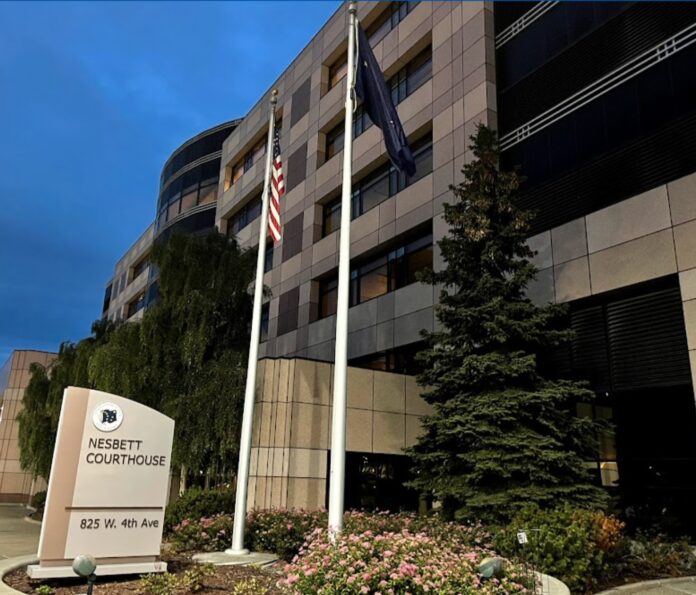Part I: Is a Constitutional Showdown Coming?
By Jon Faulkner, Co-author and Bob Bird, Co-author
With regard to the hierarchy of constitutional authority, we all hear about the three co-equal branches of government. But a serious inquiry into our foundational documents informs us that actual equality exists neither in the U.S. constitution, nor in Alaska’s.
In Alaska’s constitution, Article 4 states, “The jurisdiction of the courts shall be prescribed by law.” Meaning, the judiciary’s scope is subordinate to the legislature. And we read in Article 3, Section 16, that the governor’s authority “shall not be construed to authorize any action or proceeding against the legislature.”
Does this make the legislative branch supreme? No, not quite, for all branches of government are subordinate to the citizens. One simple instrument that effectuates every citizen’s essential sovereignty, and their right to investigate potential infringements of it, is the grand jury.
Alaska citizens are re-asserting this fundamental right. Take a look at Article 1, Section 2:
§ 2. Source of Government
All political power is inherent in the people. All government originates with the people, is founded upon their will only, and is instituted solely for the good of the people as a whole.
Alaska’s constitution may have flaws, but none question this foundational source of all power. The question becomes: “Who protects this power of the people?” Elections are one way, but hardly the only way. The constitutional power vested in our governor, among the most extensive grants of any state, is another avenue. This power is found in Article 3, Section 16:
§ 16. Governor’s Authority
The governor shall be responsible for the faithful execution of the laws. He may, by appropriate court action or proceeding brought in the name of the State, enforce compliance with any constitutional or legislative mandate, or restrain violation of any constitutional or legislative power, duty, or right by any officer, department, or agency of the State or any of its political subdivisions. This authority shall not be construed to authorize any action or proceeding against the legislature.
Thus, Governor Dunleavy has defined authorities over all branches of government and their respective bureaucracies, excepting only the legislature itself. On the narrow topic of enforcing citizen’s constitutional rights, it is not true that the judicial branch has exclusive purview. In Alaska, the Executive officer has supreme authority in matters of considerable consequence. The issue of constitutionally based duty and supreme authority to act in the people’s interest is about to explode.
Put plainly, if the judicial branch has—wittingly or not—prevented any Grand Jury from exercising its constitutionally mandated power, then the governor must intervene on behalf of the people to enforce the mandate. He may also restrain any violation of a constitutional power by any officer, agency or department of the state. This is not wishful thinking on the part of conservative activists; this is foundational compact law.
Many Alaskans believe that Supreme Court Order 1993 was corrupt—motivated to limit the rights of the grand jury in Alaska. Here is what our state constitution states about the purpose and power of the people’s grand jury:
§ 8. Grand Jury
No person shall be held to answer for a capital, or otherwise infamous crime, unless on a presentment or indictment of a grand jury, except in cases arising in the armed forces in time of war or public danger. Indictment may be waived by the accused. In that case the prosecution shall be by information. The grand jury shall consist of at least twelve citizens, a majority of whom concurring may return an indictment. The power of grand juries to investigate and make recommendations concerning the public welfare or safety shall never be suspended.
Many Alaskans have come to believe the power of grand juries to investigate corruption and abuse of power within our government has been suspended by the judicial branch. When Alaska’s citizenry cannot reasonably understand or comply with the procedural complexities the judiciary has erected to process citizen complaints, then a “de-facto” denial of constitutional intent and due process is present. Proof of this exists, and Alaskans are pressing their case.
Their case is based on Supreme Court Order 1993 (SCO 1993) and the restrictive regulations issued since by the Department of Law to implement this order. Protocols adopted by the AG that aggregate and impose strict “gatekeeping” powers serve to unreasonably hinder the grand jury’s power to perform their constitutional function.
It is unnerving when our constitutional rights hinge on a single person’s vote. Here’s what Supreme Court justices Compton and Burke wrote in their dissent of the Supreme Court ruling in 1991 that provides the foundation for today’s protocols:
“This procedural rule is not the least bit deferential to the “anti-suspension” clause. Indeed, it mocks it. The Grand Jury, and not the courts, can choose matters on which it reports and recommends, and the manner in which to do so. Its constitutional power shall never be suspended by the overlay of cumbersome procedures which provide for private judicial adjudications and review of whether the report it is to publish adversely reflects on someone, or otherwise violates his or her constitutional rights.”
By a single vote, these high-court objections were dismissed and our modern protocols became law. The question today is: how can the people overcome this travesty of justice?
Governor Dunleavy, our elected Executive, must declare SCO 1993 null, void, and of no effect, since it is deemed by him, acting alone if necessary, to be unconstitutional. He has the power, the duty—and the proof– that compels this declaration.
Every candidate for governor will be asked to take a stand. Who among them will grasp and affirm the present injustice, then pledge to remedy it on behalf of Alaska citizens? This great state belongs to the people. To be worthy of this responsibility, we must be informed and willing to act. The current restrictions placed on grand juries, just as Burke and Compton warned, suspend a constitutionally based power retained by the people.
